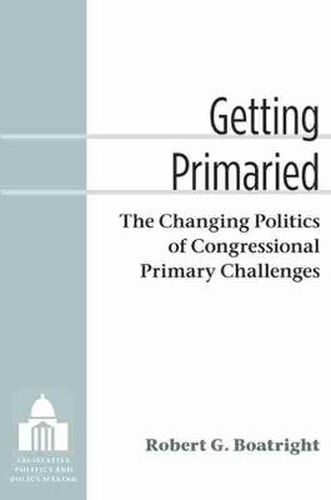Readings Newsletter
Become a Readings Member to make your shopping experience even easier.
Sign in or sign up for free!
You’re not far away from qualifying for FREE standard shipping within Australia
You’ve qualified for FREE standard shipping within Australia
The cart is loading…






Each of the past few election cycles has featured at least one instance of primarying, a challenge to an incumbent on the grounds that he or she is not sufficiently partisan. For many observers, such races signify an increasingly polarised electorate and an increasing threat to moderates of both parties.
In Getting Primaried, Robert G. Boatright shows that primary challenges are not becoming more frequent; they wax and wane in accordance with partisan turnover in Congress. National fundraising efforts and interest group-supported primary challenges, however, have garnered media attention disproportionate to their success in winning elections. Such challenges can work only if groups focus on a small number of incumbents.
Boatright’s study makes three key contributions. First, it presents a history of congressional primary challenges over the past forty years, a history that not only measures the frequency of competitive challenges but also seeks to distinguish among types of challenges. Second, it provides a correction to accounts of the link between primary competition and political polarisation. Third, it provides a new theoretical lens for understanding the role of interest groups in congressional elections.
$9.00 standard shipping within Australia
FREE standard shipping within Australia for orders over $100.00
Express & International shipping calculated at checkout
Each of the past few election cycles has featured at least one instance of primarying, a challenge to an incumbent on the grounds that he or she is not sufficiently partisan. For many observers, such races signify an increasingly polarised electorate and an increasing threat to moderates of both parties.
In Getting Primaried, Robert G. Boatright shows that primary challenges are not becoming more frequent; they wax and wane in accordance with partisan turnover in Congress. National fundraising efforts and interest group-supported primary challenges, however, have garnered media attention disproportionate to their success in winning elections. Such challenges can work only if groups focus on a small number of incumbents.
Boatright’s study makes three key contributions. First, it presents a history of congressional primary challenges over the past forty years, a history that not only measures the frequency of competitive challenges but also seeks to distinguish among types of challenges. Second, it provides a correction to accounts of the link between primary competition and political polarisation. Third, it provides a new theoretical lens for understanding the role of interest groups in congressional elections.